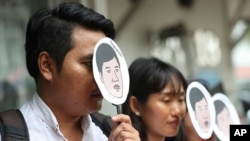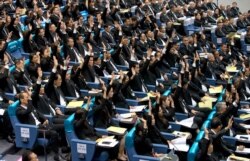When the coterie of top generals that toppled Thailand's government in 2014 announced the long-awaited elections that were held in March, they promised a speedy return to democracy after five years of military rule.
Nine months on, the election those army men had sold as a watershed moment and went on to win in a tainted vote after trading in their uniforms for suits looks to many Thais instead like a false dawn.
Political analysts and rights groups told VOA that Thailand has made little if any headway in restoring democracy since the election under a pro-military government that has tracked down dissidents, set the stage for the court-ordered dissolution of a thorny opposition party and stifled what space was left for free speech online.
"The very same group of elites still [has] control, so it's just a new form of military government," Titipol Phakdeewanich, dean of the political science faculty at Ubon Ratchathani University, said of the current administration.
"I think it actually makes it worse for the country to stay in this situation because it is portrayed as a democratic country when it is not," he added. "It is a kind of illusion for interaction with the West, because the military is still here and they use [the] legal system to take control of everything."
Titipol said the political pantomime started with the election itself, held under a constitution the junta drafted after the coup to hobble larger parties — the anti-military Pheu Thai in particular — at the polls. After initial election results showed that Pheu Thai and its allies had nevertheless done well, an election commission appointed by the junta changed the criteria for allocating parliamentary seats in such a way that denied the parties a majority in the lower house.
"They seemed to make the rules up after the election results had actually come in," said James Buchanan, a doctoral candidate at the City University of Hong Kong researching Thai politics.
The constitution the junta drafted also authorized the Senate — again, handpicked by the junta — to join the popularly elected House of Representatives in voting on the prime minister. The senators' ballots successfully tipped the scales in favor of the military's preferred candidate, Prayut Chan-ocha, the ex-general who led the 2014 coup.
Heading into the election, the junta had vowed to cancel the hundreds of diktats it handed down over the past five years, but analysts say it held on to some by folding them into existing laws, including a decree giving the military the power to detain people for up to seven days without charge.
In November, when the opposition caught the ruling coalition off guard and mustered just enough votes to pass a motion to set up a special panel to review those decrees, the speaker of the House called a recount that turned into a second vote days later that saw the motion narrowly defeated.
"So there [are] no real rules in the House; it's rule just by those who have power," said Titipol.
The months after the election also saw a spike in violent assaults on outspoken critics of the junta by gangs of men in masks and helmets wielding truncheons or metal pipes. Activists said the attacks, usually in broad daylight and in public, were meant to send a message.
Critics of the junta have continued to live in fear abroad as well. Between March and May, three Thai pro-democracy activists in self-imposed exile in Laos reportedly went missing on a trip to Vietnam. Another dissident was arrested in Malaysia and deported back to Thailand to face charges of sedition and joining a secret organization.
The upstart Future Forward party, which finished a strong third in the March election on the back of a strident anti-junta platform, has meanwhile come under a barrage of legal attacks its leaders and supporters say is politically motivated. The Constitutional Court convicted its leader, Thanathorn Juangroongruangkit, last month for owning shares in a media company while running for office, stripping him of his lower house seat. The court is due to decide in January whether to dissolve the entire party for alleged sedition.
"These kinds of human rights abuses are all kind of taking place in a context in which ... those in power are not being held accountable for their actions," said Buchanan.
Analysts and advocates say the digital space for dissent is shrinking as well. A Cybersecurity Act the junta approved before the election took effect in May, giving the government broad new powers to monitor online data. In October the government ordered coffee shops offering free Wi-Fi to start tracking and saving their customers' online activity. It opened a center to monitor and counter fake news on social media the following month.
Emilie Pradichit, director of Thailand's Manushya Foundation, a rights group, said the government was "weaponizing" the new act and fake news center to silence critics and smother online dissent the way the junta used sedition and defamation laws.
"They try to show that they moved from a military government to a democratic government by [stopping the use of] laws for which they have been called [out] on by the international community," she said. In reality, she said, "it's getting worse. I think we are really entering a time of digital dictatorship."
Government spokeswoman Narumon Pinyosinwat denied that Thailand was failing to revive democracy, when asked to respond to claims that it was.
"Democracy is in full stream right now, so I don't have any comment on what you just asked because it's not true," she said.
Narumon also denied that the election commission had changed the criteria for allocating lower house seats after the results were in.
She refused to answer any questions about the Cybersecurity Act or the lawsuits against the Future Forward party, before hanging up.
Authorities have previously denied any political motive behind the lawsuits against Future Forward and said they needed the Cybersecurity Act and fake news center to catch genuine criminals. They have denied any knowledge of the missing dissidents and said the attacks on the pro-democracy activists were under investigation.









